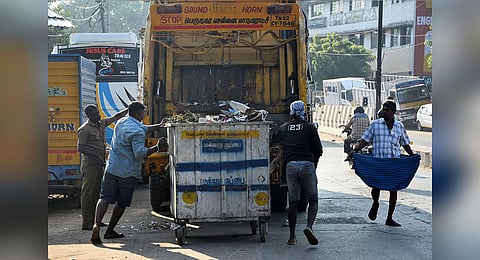

CHENNAI: After privatising waste management in 10 zones, the Greater Chennai Corporation (GCC) is now planning to privatise waste management in the five remaining zones. TNIE attempts to find out how waste management done by private entities affects the residents.
At present, waste management in all zones except for Tondiarpet, Anna Nagar, Royapuram, Thiru Vi Ka Nagar and Ambattur, have been handed over to Ramky Enviro in the northern parts of the city and Urbaser Sumeet in the south.
When asked what has changed after waste management was privatised in Thiruvottiyur two years ago, Mageshwari, a resident said, “Corporation workers were sometimes irregular whereas private companies quickly replace the absentees, thus ensuring waste is collected.” In terms of overall cleanliness, however, there is not much difference, said residents. Moreover, they feel that it was easier to register complaints with the GCC.
For better or for worse
When asked about the working conditions, staff at Ramky Enviro alleged that some supervisors demand between Rs 100 - Rs 200 for extra leaves with attendance, beyond their regular week offs, and those who refuse to pay are subjected to immense pressure and are assigned as spare workers.
A women sanitary worker on condition of anonymity said, “Those who get along with the supervisors benefit with less work while others need to manage more than their share. While working under the GCC, I never faced such problems.”
Burdened with unfair targets and stressful working conditions, many have quit, said another worker.
“Those of us still working do not know how long we can carry on. The most important aspect of achieving a clean city is to keep workers happy,” said Shanthi (name changed).
In the south, each BoV (battery operator vehicle) drivers of Urbaser Sumeet are responsible for collecting waste from 450 households. They claimed that each day, they are required to collect 120-150 kg of biodegradable waste and 15-20 kg of non-biodegradable waste. The roadside sweepers need to collect 10 kg of plastic waste. If these targets are not met, then they are questioned by superiors and may be put in the underperforming category.
When contacted, a zonal-level corporation official said, “Waste collection, segregation, conversion, and transportation processes are similar. The GCC also has similar facilities for its employees, such as BoVs and a common target of collecting waste from 450 households.
However, people tend to trust private entities, which has led to privatisation. Ultimately, the decision to privatise is made by the government,” he said.